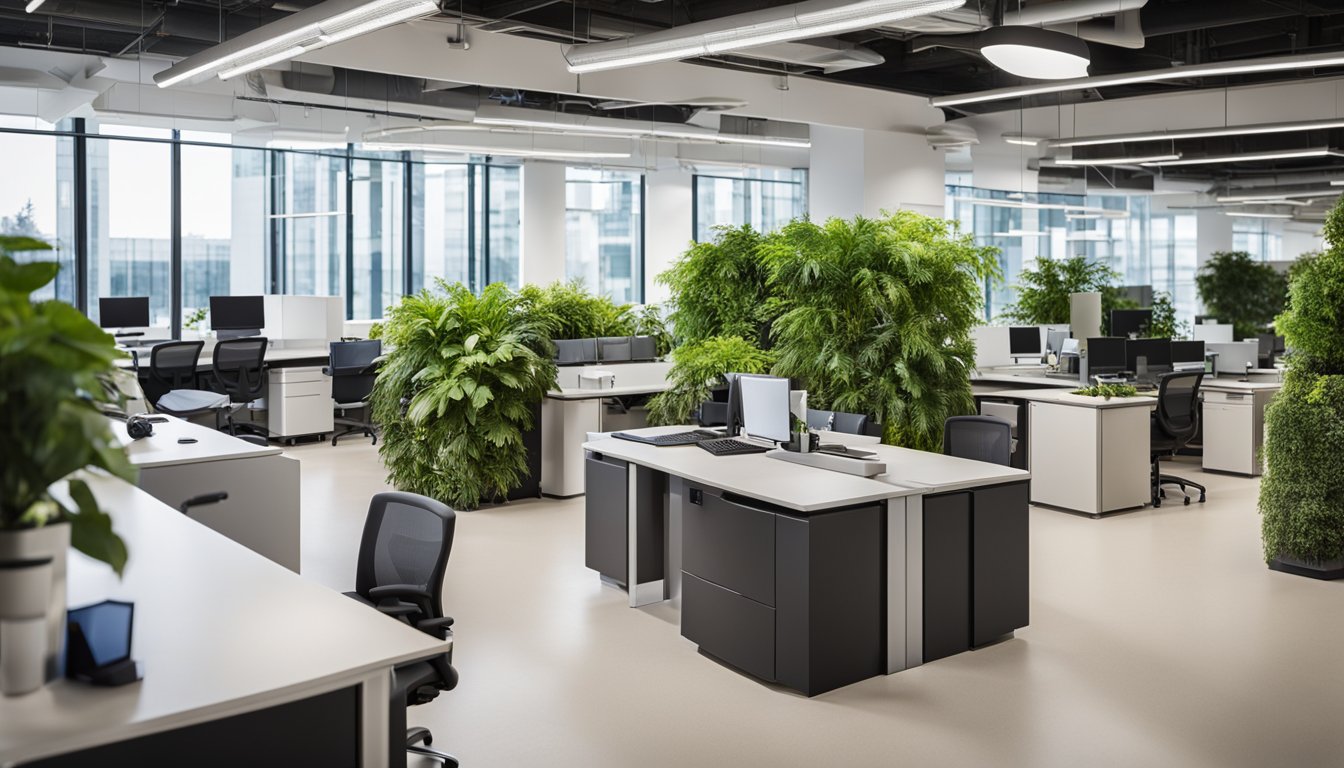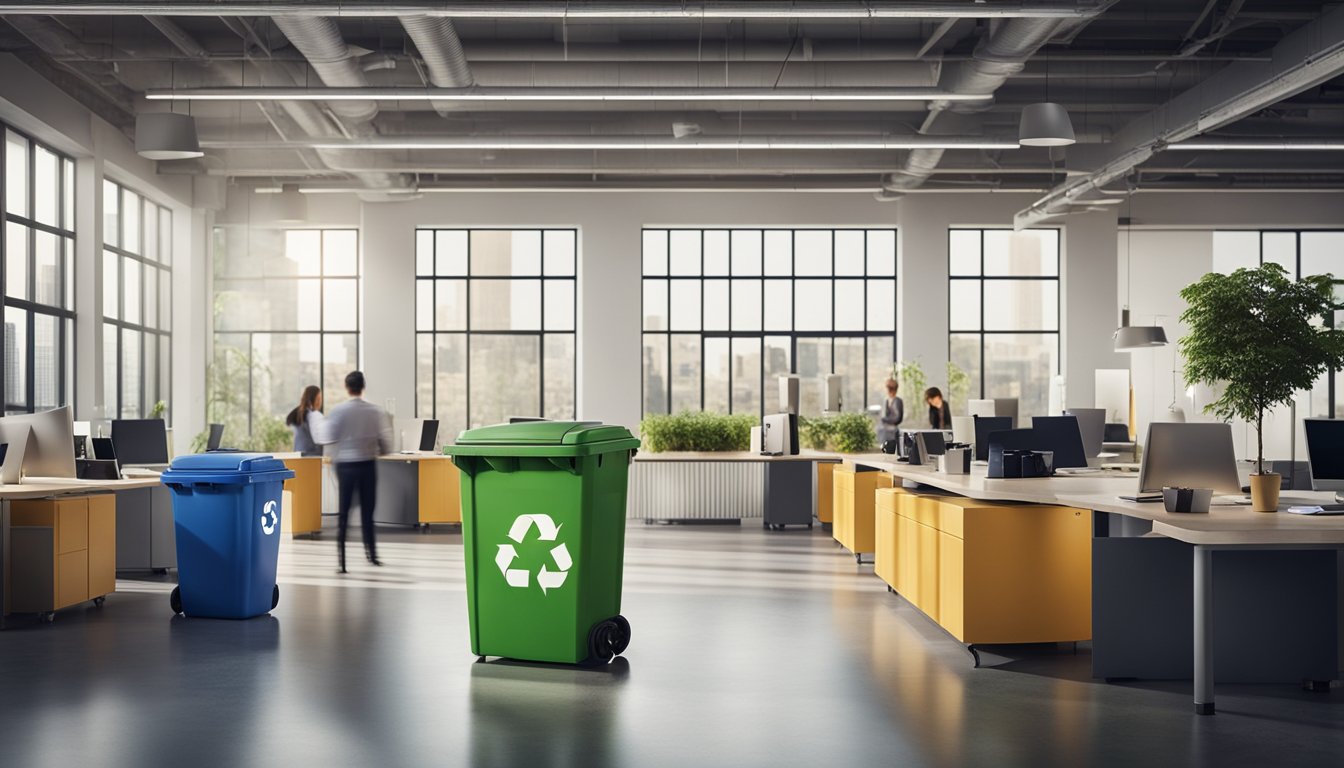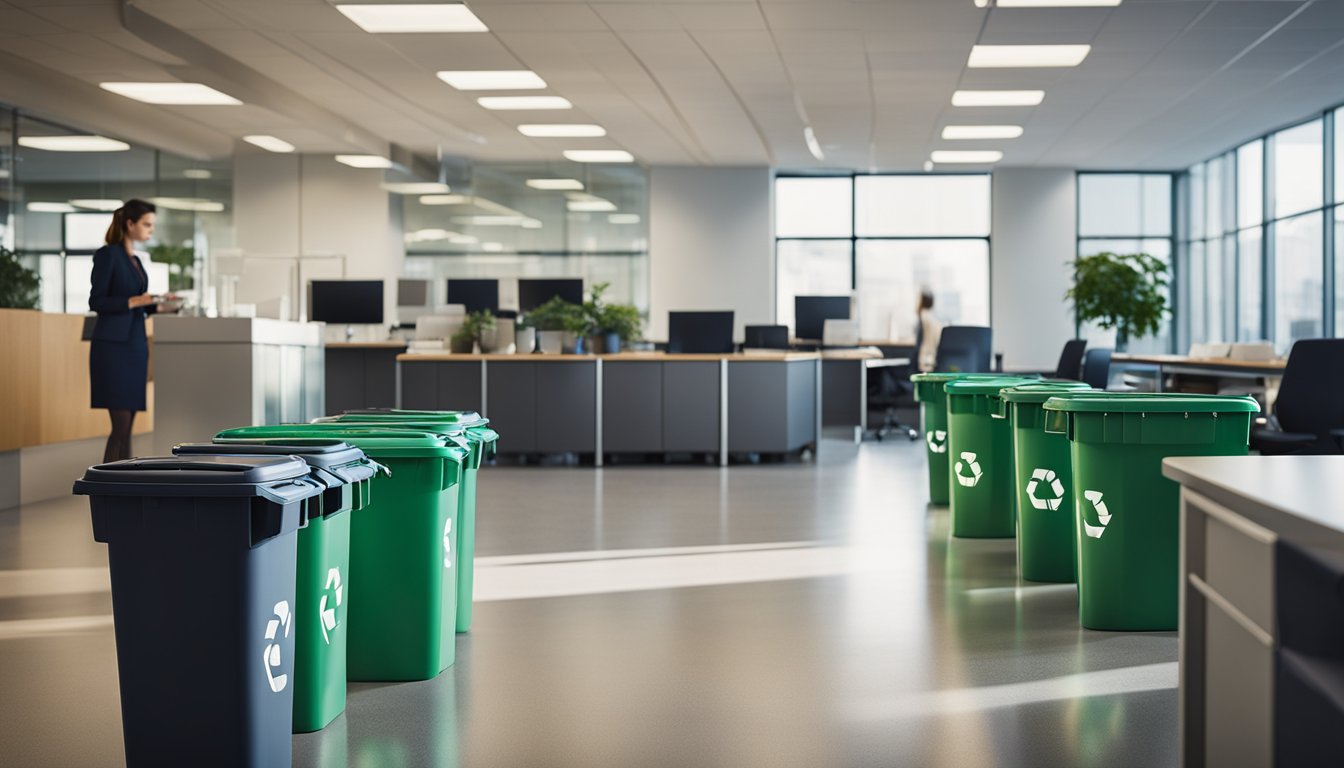Late updated: 14 Oct 2024 11:10
Written by: Amber Collins
Promoting Sustainable Office Habits in UK Workplaces: Practical Strategies for Change
The push towards sustainability in UK workplaces is gaining momentum as both environmental awareness and practical benefits become apparent. In a world increasingly focused on reducing carbon footprints and conserving resources, promoting sustainable office habits is more than a trend; it has become a necessary practice for businesses looking to thrive in a green future. Embracing eco-friendly practices in the office not only reduces environmental impact but also enhances workplace efficiency and employee morale.

As businesses across the UK strive to integrate green initiatives, understanding the role of sustainability in our workplaces is vital. Many companies are already taking steps such as reducing paper use, switching to renewable energy, and fostering a culture of sustainability among employees. These actions illustrate how being green can offer significant advantages beyond just environmental benefits, extending to economic savings and improved brand reputation.
The focus on sustainable practices, when effectively implemented, can transform a workplace. Whether it’s small changes like energy-efficient lighting or larger commitments like adopting renewable energy sources, each step contributes to a more sustainable environment. Our goal is to guide you through practical, impactful strategies to promote sustainability in your office, ensuring both ecological and business growth.
Key Takeaways
- Sustainable office practices boost efficiency and morale.
- Green initiatives help businesses thrive environmentally and economically.
- Practical steps can transform workplaces into eco-friendly spaces.
The Role of Sustainability in UK Workplaces
Incorporating sustainability in UK workplaces addresses environmental impact and aligns with both practical and strategic business goals. Key elements include defining what makes an office sustainable, understanding the benefits of implementing these practices, and recognising legal frameworks guiding environmental responsibility.
Defining a Sustainable Office
A sustainable office minimises its environmental footprint through efficient use of resources and innovative technologies. Our focus should be on energy conservation, waste reduction, and sustainable procurement. Implementing smart lighting systems and using energy-efficient appliances highlights the commitment to reducing energy consumption.
Waste management strategies, such as recycling and reducing paper use, also play a pivotal role. Promoting digital documentation over printing reflects a move towards lower resource dependency. Sustainable procurement involves choosing suppliers who share our commitment to ethical and environmental standards, ensuring that every purchase supports our sustainability goals.
Benefits of Sustainability Initiatives
Implementing sustainability initiatives yields several benefits for UK businesses. Firstly, these practices can lead to cost savings in energy consumption and waste management. By adopting energy-saving measures, offices reduce utility expenses and divert funds to other growth areas. Moreover, sustainability in the workplace boosts employee satisfaction and retention, as individuals are more likely to remain with companies that align with their values.
Environmental benefits also include reduced carbon emissions and improved air quality, contributing to broader climate change mitigation efforts. Transparency with stakeholders about these initiatives furthers trust and supports branding efforts. As we embrace a culture of conservation, we position ourselves not only as responsible businesses but as industry leaders in innovation and ecological stewardship.
Legal Framework and Environmental Responsibility
UK businesses are governed by various legal frameworks that dictate their environmental responsibilities. The Climate Change Act 2008 sets ambitious targets for reducing carbon emissions, encouraging firms to integrate sustainable practices at all levels. Compliance is not just about following the law but exceeding expectations to foster long-term sustainability.
Corporate responsibility initiatives require us to engage with current regulations and commit to continual improvement. A proactive approach involves regular assessment of our practices against legal standards. Furthermore, sharing our journey towards environmental responsibility with stakeholders demonstrates our commitment to transparency and accountability. Through these efforts, we showcase our dedication to building a sustainable future while meeting regulatory requirements.
Implementing Sustainable Practices

Incorporating sustainable practices in UK offices has a substantial impact on reducing carbon emissions and promoting employee well-being. By focusing on energy efficiency, waste management, sustainable design, and conscious procurement, we can create an eco-friendly office environment that supports the local economy and enhances workplace productivity.
Energy Efficiency and Renewable Energy
Reducing energy consumption is crucial for any sustainable office. We should consider investing in LED lighting, which is cost-effective and energy-efficient. Implementing smart thermostats can optimise heating and cooling, reducing excess usage.
We should also explore switching to 100% renewable energy sources. This change significantly lowers our carbon footprint and supports the transition to more sustainable energy. Solar panels or joining green energy cooperatives can be part of this initiative.
Encouraging flexible work arrangements, such as remote work, helps decrease office energy requirements. These practices not only lead to cost savings but also demonstrate a commitment to environmental responsibility.
Waste Management and Recycling Programs
Effective waste management is pivotal in creating a sustainable workplace. Let’s initiate a comprehensive recycling program to manage office waste efficiently. Clearly labelled recycling bins make it easier for employees to dispose of waste correctly.
We can also take steps to reduce waste by promoting the use of digital documents over printed copies and supporting the use of reusable office supplies. Composting organic waste is another strategy for cutting down landfill contributions.
Participation in sustainability initiatives, such as BREEAM or LEED certification, provides structured guidelines for improving waste management and recycling processes. A focus on low waste generation reinforces our commitment to sustainability.
Sustainable Office Design and Well-being
Designing an office with sustainability and well-being in mind boosts productivity and improves air quality. We should utilise natural light and natural ventilation to reduce dependence on artificial systems, enhancing indoor air quality and cutting energy use.
Living walls and incorporating biophilic design elements can improve air quality and create a more pleasant work environment. These features also support the psychological well-being of our employees by bringing elements of nature into the workspace.
Ensuring a balance through sustainable office design not only positively affects staff wellbeing but also aligns with broader company goals of sustainability and eco-friendliness, offering a healthier workplace.
Sustainable Procurement and Local Economy Impact
Sustainable procurement practices include choosing suppliers aligned with our values of sustainability. Prioritising local businesses can reduce transportation emissions and bolster the local economy.
We should aim to source office materials from suppliers committed to environmentally friendly practices and utilise recyclable or reusable materials wherever possible. Opting for eco-friendly office furniture and supplies ensures that we support sustainable production methods.
Investing in products and services that have a lower environmental impact aids in carbon emissions reduction and demonstrates our commitment to a more sustainable future. Establishing policies centred on sustainable procurement elevates our corporate responsibility and environmental stewardship.
Frequently Asked Questions

Our exploration of sustainable office habits covers ways to minimise paper use, promote green commuting, enhance building energy efficiency, and foster a culture of sustainability. We also examine the impact of these measures on business performance and the significant role management plays in guiding eco-friendly behaviour.
What are effective strategies for reducing paper waste in office environments?
Reducing paper waste can begin with adopting digital alternatives for documentation and communication. Implementing a robust digital filing system and encouraging the use of electronic documents significantly cuts down paper use. Additionally, setting printers to double-sided printing and using recycled paper where necessary are practical steps.
How can businesses encourage employees to adopt sustainable commuting methods?
Offering incentives, such as subsidising public transport or providing facilities for cyclists, encourages green commuting. Establishing a carpool programme can also reduce individual car use. Flexible working hours and remote work options can further decrease the environmental impact of daily commutes.
In what ways can office buildings be retrofitted to conserve energy?
Retrofitting buildings with energy-efficient lighting, such as LEDs, and installing smart thermostats can significantly lower energy consumption. Improving insulation and upgrading windows to those with better energy ratings also contribute to enhanced efficiency. Implementing renewable energy solutions, like solar panels, can offer long-term energy savings.
What initiatives can be introduced to support a sustainable work culture among staff?
Promoting sustainability through workshops and training creates awareness and engagement among staff. Establishing a green team to lead initiatives and recognising sustainable practices with awards can foster a positive culture. Encouraging sustainable office habits, such as reducing, reusing, and recycling, integrates environmental responsibility into daily routines.
How do sustainability measures in the workplace contribute to overall business performance?
Implementing sustainability measures can lead to cost savings and improved resource efficiency, enhancing financial performance. These practices often boost a company's reputation and attract eco-conscious clients or partners. Furthermore, they can increase employee satisfaction by aligning with their values, which contributes positively to productivity and retention.
What role does management play in fostering environmentally responsible behaviour within the company?
Management's commitment is crucial in setting sustainability goals and policies. By actively participating in and supporting green initiatives, they can lead by example, which inspires staff to adopt similar behaviours. Providing resources and establishing clear guidelines for sustainable practices ensures these efforts are effectively integrated into the organisation's operations.
